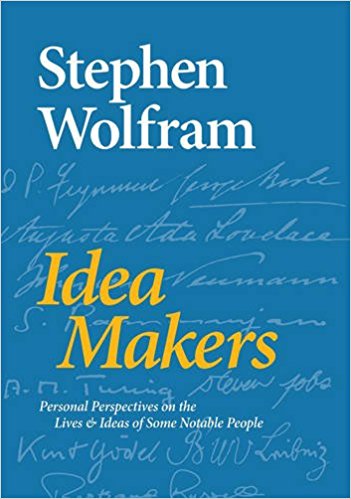We hope you love the books people recommend! Just so you know, The CEO Library may collect a share of sales or other compensation from the links on this page.
This book has 1 recommendation
Nassim Nicholas Taleb (Flaneur)
The general public is usually supplied by books on mathematical scientists written by "science communicators" and other outside observers--the worst by far being the academic historians of science. Their books are like reviews of comparative squid ink recipes written by anorexics, or descriptions of the Loire Valley by visually impaired travel writers. They are well written, which masks the BS. The descriptions focus on "interesting" traits of the personalities; scientists are discussed as if they were partaking of spectator sports. This fellow "was the best...", this fellow "was the first to...", "Einstein made a big blunder", etc. This book, "Idea Makers", is written from an insider. It is the real thing on several accounts.
Primo, Wolfram deserves to be in the book as an "idea maker", in his own right. Secondo, Wolfram is the developer of a new way to do (useful) mathematics, an entirely new method, which allows us to tinker with mathematics, something that is an anathema to purists. Thus he depicts Ramanujan, not with the usual mathematical prism of the theorem crowds, but as someone who, starting with intuitions, does experiments till a mathematical identity feels right.
As an eyewitness, I spent almost all my career in quant finance and probability toying with Mathematica (Stephen Wolfram's invention), and saw it accumulate special functions and tools. Mathematica allowed me to be a car mechanic who looked under the hood; such experience makes us look at the pompous theoretician as a cook would a nerdy chemist.
The book is about this refreshing perspective: theorems were to Ramanujan a thing used by European mathematicians to convince other European mathematicians. Terso, Wolfram is fair. He shows a fair --even adulatory-- portrait of Mandelbrot, in spite of attacks by the latter. Indeed, if Mandelbrot hated someone, the person has to be good and threatening. Otherwise he would not bother mentioning him.
Finally, many of the people involved are actually known either personally (Feynman, Mandelbrot, Minsky), or like Boole, Ramanujan, Godel, and Lebnitz, "connect" to the author.
Amazon description
This book of thoroughly engaging essays from one of today's most prodigious innovators provides a uniquely personal perspective on the lives and achievements of a selection of intriguing figures from the history of science and technology. Weaving together his immersive interest in people and history with insights gathered from his own experiences, Stephen Wolfram gives an ennobling look at some of the individuals whose ideas and creations have helped shape our world today.
From his recollections about working with Richard Feynman to his insights about how Alan Turing's work has unleashed generations of innovation to the true role of Ada Lovelace in the history of computing, Wolfram takes the reader into the minds and lives of great thinkers and creators of the past few centuries and shows how great achievements can arise from dramatically different personalities and life trajectories.
Get this book on Amazon | Barnes & Noble | Book Depository | iBooks




